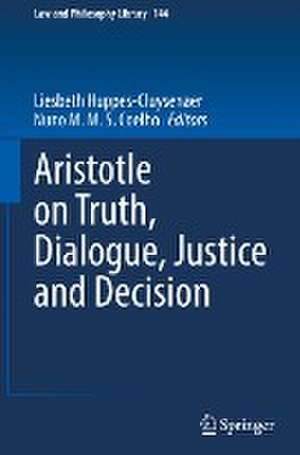Aristotle on Truth, Dialogue, Justice and Decision: Law and Philosophy Library, cartea 144
Editat de Liesbeth Huppes-Cluysenaer, Nuno M.M.S. Coelhoen Limba Engleză Hardback – 28 dec 2023
In this thought-provoking book, you’ll find timeless questions explored through a fresh lens. First delving into the profound significance of Socrates’ dialogical method and the inescapable nature of conflict, it ponders the rational capacities of humanity in terms of establishing harmonious communities. But this isn’t merely a philosophical debate; it’s a pragmatic exploration of real-world challenges.
No longer limiting itself to abstract theories, the book then seeks to navigate the practical terrain of science and politics. Drawing inspiration from Aristotle, renowned for his investigations into the intricate connections between theory, technology, ethics, and politics, it tackles the essential question: How can we reconcile divergent views?
Din seria Law and Philosophy Library
- 20%
 Preț: 813.11 lei
Preț: 813.11 lei - 20%
 Preț: 569.00 lei
Preț: 569.00 lei - 18%
 Preț: 1225.16 lei
Preț: 1225.16 lei - 18%
 Preț: 950.66 lei
Preț: 950.66 lei - 15%
 Preț: 583.43 lei
Preț: 583.43 lei - 15%
 Preț: 639.25 lei
Preț: 639.25 lei - 15%
 Preț: 641.53 lei
Preț: 641.53 lei - 18%
 Preț: 893.84 lei
Preț: 893.84 lei - 24%
 Preț: 797.39 lei
Preț: 797.39 lei - 15%
 Preț: 579.84 lei
Preț: 579.84 lei - 15%
 Preț: 644.95 lei
Preț: 644.95 lei - 18%
 Preț: 895.76 lei
Preț: 895.76 lei - 15%
 Preț: 644.95 lei
Preț: 644.95 lei - 20%
 Preț: 571.85 lei
Preț: 571.85 lei - 15%
 Preț: 642.03 lei
Preț: 642.03 lei - 18%
 Preț: 1232.26 lei
Preț: 1232.26 lei - 18%
 Preț: 1116.05 lei
Preț: 1116.05 lei - 15%
 Preț: 655.92 lei
Preț: 655.92 lei - 18%
 Preț: 833.54 lei
Preț: 833.54 lei - 18%
 Preț: 898.26 lei
Preț: 898.26 lei - 18%
 Preț: 1016.63 lei
Preț: 1016.63 lei -
 Preț: 390.25 lei
Preț: 390.25 lei - 24%
 Preț: 700.89 lei
Preț: 700.89 lei - 18%
 Preț: 999.60 lei
Preț: 999.60 lei - 18%
 Preț: 1115.77 lei
Preț: 1115.77 lei - 18%
 Preț: 1107.88 lei
Preț: 1107.88 lei - 15%
 Preț: 637.46 lei
Preț: 637.46 lei - 18%
 Preț: 781.94 lei
Preț: 781.94 lei - 24%
 Preț: 815.54 lei
Preț: 815.54 lei - 18%
 Preț: 786.18 lei
Preț: 786.18 lei - 18%
 Preț: 735.21 lei
Preț: 735.21 lei - 15%
 Preț: 653.33 lei
Preț: 653.33 lei - 18%
 Preț: 782.10 lei
Preț: 782.10 lei
Preț: 894.97 lei
Preț vechi: 1091.42 lei
-18% Nou
Puncte Express: 1342
Preț estimativ în valută:
171.27€ • 185.98$ • 143.87£
171.27€ • 185.98$ • 143.87£
Carte tipărită la comandă
Livrare economică 22 aprilie-06 mai
Preluare comenzi: 021 569.72.76
Specificații
ISBN-13: 9783031454844
ISBN-10: 3031454847
Pagini: 255
Ilustrații: XIII, 255 p. 1 illus.
Dimensiuni: 155 x 235 mm
Greutate: 0.56 kg
Ediția:1st ed. 2023
Editura: Springer International Publishing
Colecția Springer
Seria Law and Philosophy Library
Locul publicării:Cham, Switzerland
ISBN-10: 3031454847
Pagini: 255
Ilustrații: XIII, 255 p. 1 illus.
Dimensiuni: 155 x 235 mm
Greutate: 0.56 kg
Ediția:1st ed. 2023
Editura: Springer International Publishing
Colecția Springer
Seria Law and Philosophy Library
Locul publicării:Cham, Switzerland
Cuprins
1. About Aristotle’s Supposed Methodological Essentialism and Absolute Monarchism.- 2. Aristotle’s Language for Success in (Practical) Explanations.- 3. The Political Nature of Logos in Aristotle.- 4. Aiming for True Life as an Act of Choice.- 5. Aristotle’s Contribution to the Judiciary Construction of Science.- 6. Aristotle’s Anthropological Conception of Justice in the Contemporary Context.- 7. Aristotle on Arbitration, Forgiveness and Rational Dialogue.- 8. Rhetorical Truth: Aristotle (and Gorgias) on Deliberation and Agonism.- 9. Aristotle’s Model of Rhetoric and Contemporary Patterns of Argumentation: on some Aristotelian Challenges.- 10. Practical Reason, Technical Perception and the Judge.- 11. Aristotelian Eudaimonism as Common Ground for Dialogue on the Good Life.- 12. Aristotle’s Conception of Truth, Perception of Particulars and Problem of Conceptualization.
Notă biografică
Liesbeth Huppes-Cluysenaer taught legal philosophy and legal sociology at the University of Amsterdam, where she coordinated the project about leading Dutch legal theorist Paul Scholten (1875-1946). Her research area is the relevance of theory of science for Jurisprudence, about which she wrote her thesis in 1995. Since 2009 she has (co)convened special workshops on the philosophy of Aristotle at the bi-annual IVR conferences, which resulted in two edited volumes, “Aristotle on Emotions in Law and Politics” (2018) and “Aristotle and the Philosophy of Law: Theory, Practice, and Justice” (2013), published by Springer.
Nuno Manuel Morgadinho dos Santos Coelho is specializing in Philosophy of Law and currently professor at the University of São Paulo, serving as the Dean of the Law School in Ribeirão Preto. With a strong focus on Ancient Philosophy, Ethics, Legal Theory and Political Philosophy, he has made contributions to these fields through exploring the philosophical foundations of law in its practical implications. His in-depth studies of particularly Aristotle's works, seek to provide insight into the role of emotions in law and politics. He (co)edited "Aristotle on Emotions in Law and Politics" (2018) and "Aristotle and the Philosophy of Law: Theory, Practice, and Justice" (2013), published by Springer.
Textul de pe ultima copertă
In this thought-provoking book, you’ll find timeless questions explored through a fresh lens. First delving into the profound significance of Socrates’ dialogical method and the inescapable nature of conflict, it ponders the rational capacities of humanity in terms of establishing harmonious communities. But this isn’t merely a philosophical debate; it’s a pragmatic exploration of real-world challenges.
No longer limiting itself to abstract theories, the book then seeks to navigate the practical terrain of science and politics. Drawing inspiration from Aristotle, renowned for his investigations into the intricate connections between theory, technology, ethics, and politics, it tackles the essential question: How can we reconcile divergent views?
Caracteristici
Elaborates the concept of dialogical truth Emphasizes the need for divergent truth claims Is based on a wide variety of texts of Aristotle
